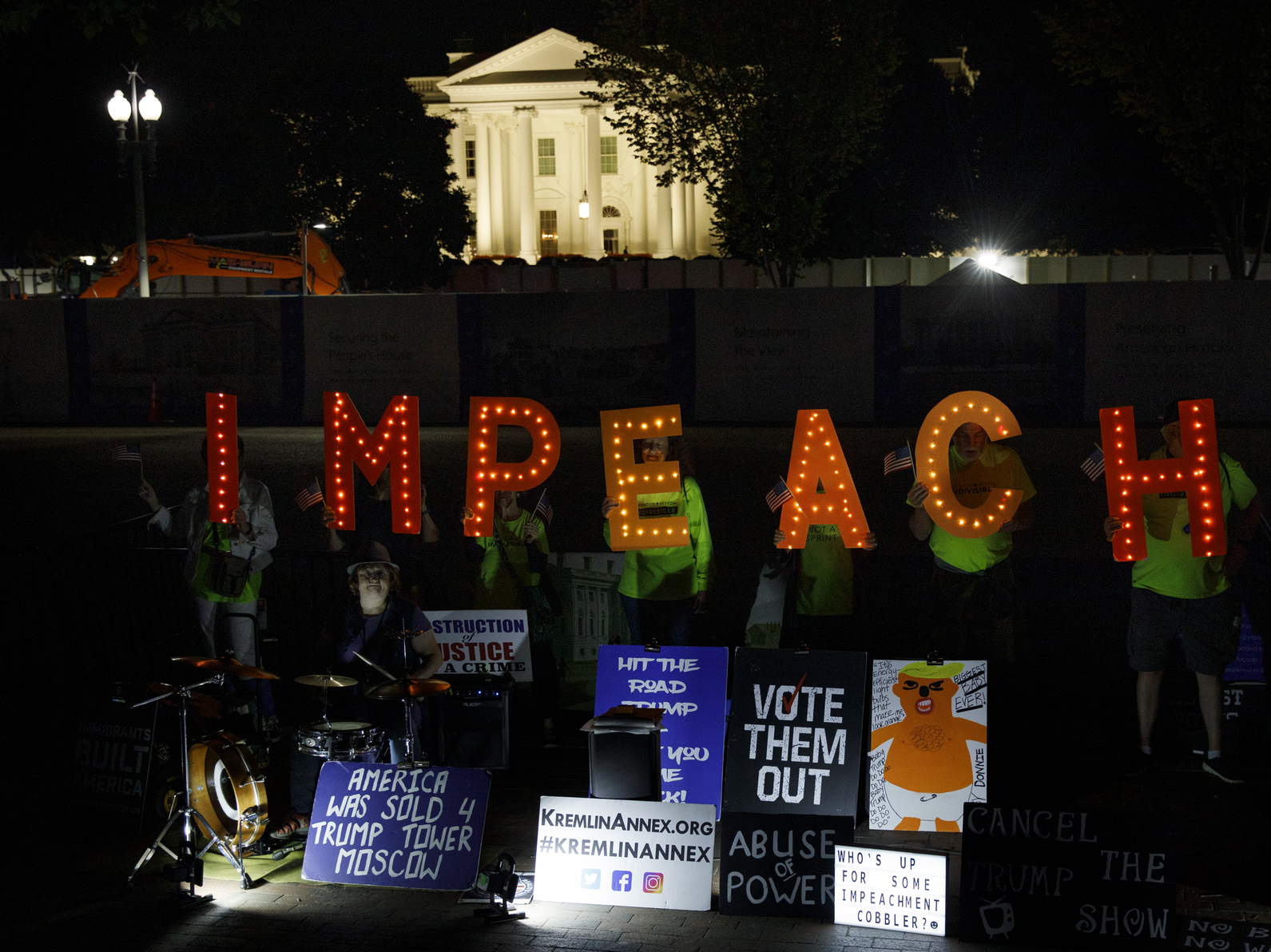Trump Ukraine Call To Be Released Amid Swelling Impeachment Push

Protesters call to impeach President Trump in front of the White House Tuesday.
Carolyn Kaster / AP
The White House is set to release a transcript Wednesday of President Trump’s scrutinized call this summer with the new Ukrainian president. But that likely won’t quell the growing movement toward impeachment in Congress.
The July 25 call is the subject of a whistleblower complaint from within the intelligence community, stirring questions about whether Trump pressured a foreign government to investigate former Vice President Joe Biden, who could be his 2020 presidential opponent.
Trump promised on Tuesday the transcript would be a “complete, fully declassified and unredacted transcript of my phone conversation with President Zelensky of Ukraine.” The president, who has said it was a “totally appropriate call,” could speak further about it Wednesday from the U.N. General Assembly in New York.
But reports that Trump threatened to withhold money to Ukraine unless the government launched an inquiry into Biden and his son, Hunter, who had once sat on the board of an energy company there, were finally the breaking point for many congressional Democrats to begin moving toward impeachment.
Calling his actions a “betrayal of his oath of office, betrayal of our national security and betrayal of the integrity of our elections,” House Speaker Nancy Pelosi said she is launching an impeachment inquiry. She had resisted pressure from more liberal members of her caucus who have been pushing for impeachment.
“The president must be held accountable,” Pelosi said. “No one is above the law.”
Democratic committee chairs have already been launching investigations into the president ever since they took control of Congress in January, and House Ways and Means Committee Chairman Richard Neal, D-Mass. — one of the six chairmen who will be part of the process — said Pelosi’s decision is “constructing an umbrella for the six chairmen to proceed now on the basis of a formal inquiry” and allowing Democrats to move forward “in a unified way.”
Rep. Jim McGovern, D-Mass., who chairs the House Rules Committee, said there aren’t plans for a full House vote right now, but that the swing in support — notably from more moderate members and ones in swing districts — shows that “the president has crossed a line. And you’re seeing a consensus growing that he’s unfit for office.”
House Minority Leader Kevin McCarthy, R-Calif., downplayed Pelosi’s announcement, noting that Democratic committees have long been probing Trump.
“She cannot unilaterally decide we’re in an impeachment inquiry,” McCarthy said. “What she said today made no difference to what’s been going on. It’s no different than what [House Judiciary Committee Chairman Jerry] Nadler’s been trying to do.”
Impeachment — the formal charging of wrongdoing against a president — could pass in a Democratic-controlled House. Just two presidents have been impeached in history: Andrew Johnson and Bill Clinton. Richard Nixon was staring down an impeachment vote amid the Watergate scandal but resigned before formal impeachment articles were brought forward.
However, no president has ever been convicted in the Senate and subsequently removed from office. And such a feat would be tough in the GOP-controlled Senate, where 67 votes would be required.
But while most Senate Republicans have remained stalwart behind Trump, there were signs that even they want answers on Tuesday as they agreed by unanimous consent that the intelligence community whistleblower should be allowed to bring his or her information to the Intelligence Committee.
On Tuesday evening, the Office of the Director of National Intelligence said it is consulting with the Executive Branch on how to connect the whistleblower with congressional intelligence committees “in a manner consistent with appropriate security practices.”
9(MDAxODM0MDY4MDEyMTY4NDA3MzI3YjkzMw004))








